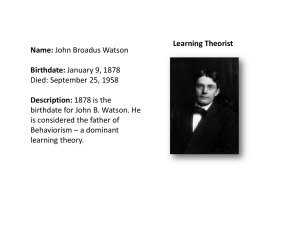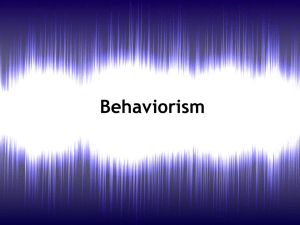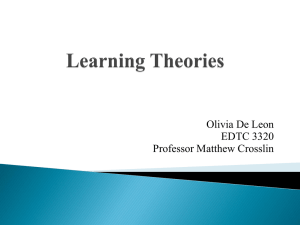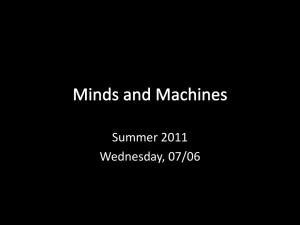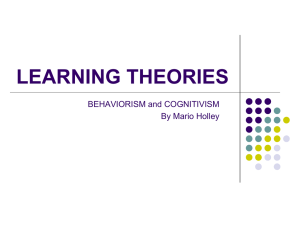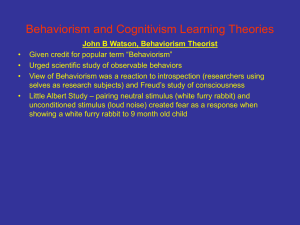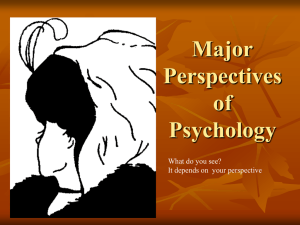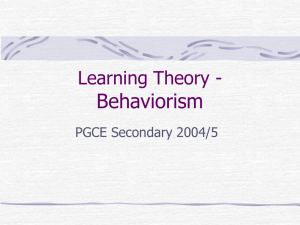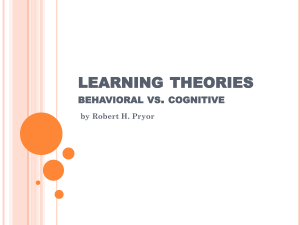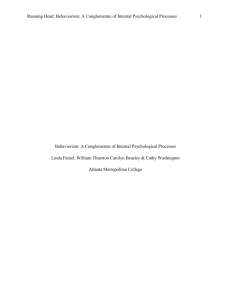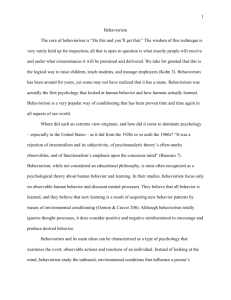Experiments in Behavioral Psychology
advertisement
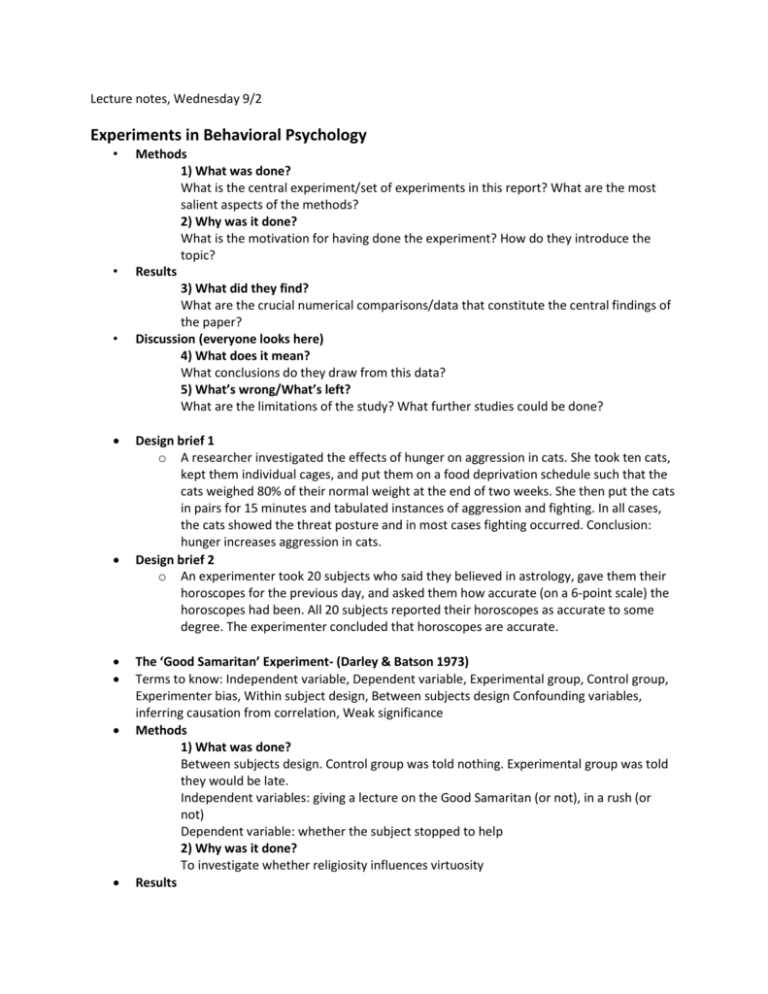
Lecture notes, Wednesday 9/2 Experiments in Behavioral Psychology • • • Methods 1) What was done? What is the central experiment/set of experiments in this report? What are the most salient aspects of the methods? 2) Why was it done? What is the motivation for having done the experiment? How do they introduce the topic? Results 3) What did they find? What are the crucial numerical comparisons/data that constitute the central findings of the paper? Discussion (everyone looks here) 4) What does it mean? What conclusions do they draw from this data? 5) What’s wrong/What’s left? What are the limitations of the study? What further studies could be done? Design brief 1 o A researcher investigated the effects of hunger on aggression in cats. She took ten cats, kept them individual cages, and put them on a food deprivation schedule such that the cats weighed 80% of their normal weight at the end of two weeks. She then put the cats in pairs for 15 minutes and tabulated instances of aggression and fighting. In all cases, the cats showed the threat posture and in most cases fighting occurred. Conclusion: hunger increases aggression in cats. Design brief 2 o An experimenter took 20 subjects who said they believed in astrology, gave them their horoscopes for the previous day, and asked them how accurate (on a 6-point scale) the horoscopes had been. All 20 subjects reported their horoscopes as accurate to some degree. The experimenter concluded that horoscopes are accurate. The ‘Good Samaritan’ Experiment- (Darley & Batson 1973) Terms to know: Independent variable, Dependent variable, Experimental group, Control group, Experimenter bias, Within subject design, Between subjects design Confounding variables, inferring causation from correlation, Weak significance Methods 1) What was done? Between subjects design. Control group was told nothing. Experimental group was told they would be late. Independent variables: giving a lecture on the Good Samaritan (or not), in a rush (or not) Dependent variable: whether the subject stopped to help 2) Why was it done? To investigate whether religiosity influences virtuosity Results 3) What did they find? No effect of religiosity on helping behavior. Effect of being in a hurry on helping behavior Behaviorism 101 • • • Philosophically, behaviorism is a response to: • The deficits of folk psychology • 1st Person: Confabulation • “Doctor, these medical students have been prodding me all day and I’m sick of it. I don’t want to use my left arm” (Ramachandran 1996: 125). • 2nd and 3rd Person: • Mind Reading • Disciplines that use opaque mental terms and intentional idioms • “The conscious mind may be compared to a fountain playing in the sun and falling back into the great subterranean pool of subconscious from which it rises.” Is psychology scientific? • “shambling, poor relation to the natural sciences” • Embarrassing cultural and historical variation • Drapetomania, dyesthaesia Aethiopica, • Homosexuality • “myth of mental illness” (szasz) • Prediction is not very effective • .3 personality coefficient • Intervention is not very effective • Recurring problems • Depression v. back trouble Skinner’s radical behaviorism: • Aka. scientific psychology • The purpose of science is prediction and control • The method of psychology is functional analysis • Pairing environmental cues with behavioral responses • The subject matter of psychology is behavior only • Because that’s all that’s observable! • Determinism: behavior is lawful • Reductionism: psychology to physiology • Generality: these principles apply to all behavior • Basic Idea: the mind and mental states can be reduced to behavior • More specifically • When we talk about a mind and different mental states • We are really just talking about, at a more abstract level: • Behaviors, Patterns of behavior, Dispositions to behave in certain ways • Philosophical behaviorism is a thesis about meaning, namely the meaning of mental & psychological terms • Philosophical behaviorism is related to, but slightly different from, psychological behaviorism • • • • • • • • • • • Psychological behaviorism is primarily a methodological thesis about how the science of psychology should be done • Explanations of behavior should only appeal to stimuli & response • And not any internal, intervening mental states Associated with Ivan Pavlov and his dogs, B.F. Skinner and his pigeons Example: unpacking what a term like “pain” means • “Tom has pain in his head” really means • “Tom moans; Tom says his head hurts; Tom is rubbing his temples a lot; etc… AND • “IF I played really loud music, THEN Tom would ask me to turn it down; IF offered Advil, THEN Tom would gladly take some…” According to behaviorism, mental terms like “pain” are completely reducible to talk about behaviors and complex dispositions to behave in certain ways So patterns of behaviors and dispositions to behave is just what mental states are There’s nothing else to them! Hence, behaviorism (if correct) counts as a materialist solution to the mind-body problem We can often do this to infer aspects of other people’s personality, beliefs, and desires that even they themselves don’t seem to know about Imagine a friend who vehemently claims they don’t have a crush on someone, but we don’t believe them all of the behavioral evidence suggests otherwise Or someone who thinks of themselves as kind and considerate, but their behavior systematically suggests they’re actually selfish and mean Two virtues of behaviorism: 1. If behaviorism is the correct solution to the mind-body problem, then the problem of other minds is easy to solve • How can I know that other minds exist, and how can I know what is going on inside them? • According to behaviorism, we can know what someone else is thinking, feeling, etc. simply by paying attention to what behavior they’re exhibiting • According to behaviorism, that behavior just is what going on in their mind – nothing deeper! 2. Behaviorism is right about our common sense practices and the evidence we regularly use to make inferences about what’s going on in people’s minds • When we infer what other people think, want, etc. we often do so based on what they do and say • Importantly, we automatically and confidently make inferences about what other people think, want, etc. • Without knowing anything about what is going on in their brain at a particular moment • Indeed, we can do so without knowing anything about brains at all! • Skinner, 1947 • • https://www.youtube.com/watch?v=8uPmeWiFTIw http://psychclassics.yorku.ca/Skinner/Pigeon/ • What (if any) are good conclusions to draw from this? • About pigeons? Animals generally? Humans? • Bargh, 1996 • “For a final illustration, consider the many studies on implicit bias. In one experiment, Bargh and colleagues (1996: 238–39) set non-African American participants to work at a computer monitor; the task, which was designed to be tedious, involved sorting groups of geometric figures according to whether their number was even or odd. As participants looked at the images on the monitor, they were primed with photographs depicting either a young African American male or young Caucasian male, which flashed on the screen too quickly for (95 percent of ) participants to consciously process. On the 130th trial of this exercise, the computer “crashed,” and participants were told they would have to repeat their work. The dependent variable was, near enough, how crabby they would be on hearing this unfortunate news: those in the African American condition manifested more hostility than did those in the Caucasian condition. While the process is incompletely understood, exposure to the picture of a young African American male apparently “activated” in cognition a stereotype that includes the representation of hostility, which somehow made hostile behavior more likely.” (Doris, 2015) • Carey, Cuddy, & Yap 2010
